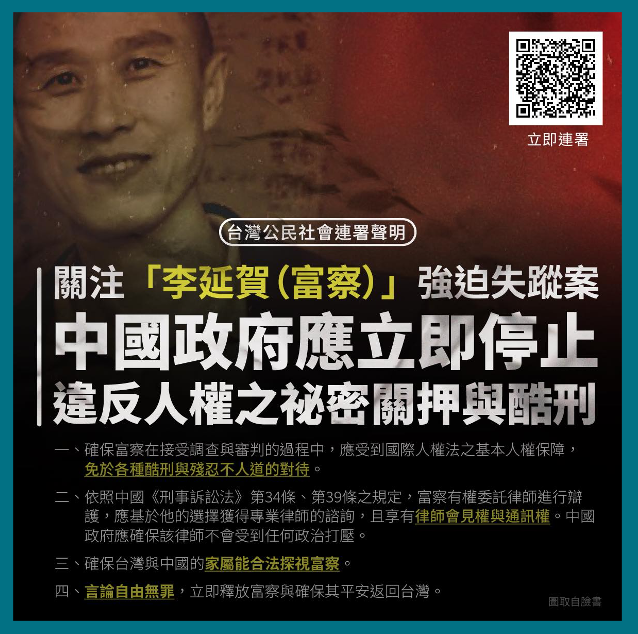Taiwan publisher detained in China likely in secret RSDL jail
It’s now been more than three months since China detained Taiwan-based publisher Li Yanhe (李延賀).
The founder and editor-in-chief of Gūsa Press, whose pen name is Fucha, had gone to China in March to renounce his Chinese nationality by cancelling his household registration.
China said it had detained Li on 31 March on suspicions of “inciting separatism” but the first official confirmation he had been detained did not come until 26 April. China routinely “disappears” political suspects, including foreigners, only going public with news of the detention many weeks or even months later.
In Chinese, the crime of inciting separatism (煽动分裂国家) is covered under Article 103 of the Criminal Code. It carries a penalty of at least five years in prison for the “ringleader”.
Why this story is important:
- Li is the second known Taiwanese person to be suspected of separatism-related crimes
- Li is likely in China’s secret RSDL jail system, condemned by the UN as a form of enforced disappearance
- Detention likely linked to Li’s publishing of books critical of the Chinese Communist Party (CCP) – activities that took place outside China
Because inciting separatism is a national security crime, it’s possible that Li is being held under ‘Residential Surveillance at a Designated Location “指定居所监视居住” (RSDL). Essentially a legalised black jail, in RSDL the prisoner is held incommunicado at a secret facility with strictly no access to lawyers. This puts them at high risk of torture. Safeguard Defenders has written extensively about RSDL in our report Locked Up. The legal maximum someone can be kept in RSDL is six months but even this is sometimes illegally extended.
Who is Li Yanhe?
 Born in China’s northeastern province of Liaoning, Li moved to Shanghai for work and then to Taiwan with his Taiwanese wife in 2009, where he founded his own publishing house, Gūsa. The company has released several books critical of the CCP including titles on human rights atrocities in Xinjiang and China’s global media plans.
Born in China’s northeastern province of Liaoning, Li moved to Shanghai for work and then to Taiwan with his Taiwanese wife in 2009, where he founded his own publishing house, Gūsa. The company has released several books critical of the CCP including titles on human rights atrocities in Xinjiang and China’s global media plans.
Although Beijing has not provided any public information on why Li is suspected of inciting separatism, it is possible that his role as publisher of books like these made him a target. He is not the only publisher that China has locked up. In 2015, Swedish Chinese-born publisher Gui Minhai was kidnapped from his holiday home in Thailand and is currently in prison in China.
According to Taiwanese media reports, Li had successfully obtained Taiwanese nationality and in accordance with Taiwan’s Act Governing Relations between the People of the Taiwan Area and the Mainland Area “臺灣地區與大陸地區人民關係條例” (Article 17) he needed to provide documentation proving he had renounced his household registration in China to complete the process.
Li could only do this by going in person to the local police station where his household registration is filed, which in his case was Shanghai (see Article 35, China’s Code of Practice for the Management of Household and Resident Identity Cards “户口居民身份证管理工作规范” ). China does not recognise dual nationality and any application to renounce Chinese nationality and the cancellation of one’s household registration must also get the state’s consent.
It is thought that Shanghai national security police detained him as he was trying to apply to renounce his household registration.
Pressure to stay silent
Li went missing in March, but it wasn’t until mid-April that friends began voicing their worries. On 20 April 2023, Taiwan’s Mainland Affairs Council (MAC) told the press that they were in contact with Li’s family in Taiwan but out of respect for them they would not share any details on the case. It is not clear how much MAC or the family are being told.
Based on the Cross-Strait Joint Crime-Fighting and Judicial Mutual Assistance Agreement, China has a legal obligation to inform Taiwan of the detention or arrest of any Taiwanese citizen in China and guarantee their access to family visits. Any visits, however, would not be permitted if Li is being held in RSDL.
Lee Ming-che (李明哲), a Taiwanese activist who also disappeared in China in 2017 and ended up serving a five-year sentence for subversion of state power (颠覆国家政权, a different crime to the Li case), said that Li’s family are likely under intense pressure to keep quiet.
While Lee's family were frightened into keeping quiet, his wife campaigned tirelessly on his behalf. Lee believes that is the reason why his treatment in RSDL and jail was better than it might have been (he spent two months in RSDL not six, and he was allowed some family visits) and why he was eventually allowed to return to Taiwan once his sentence had been served. Other Taiwanese people are still prevented from leaving.
Arrest approved for second Taiwanese man on separatism-related charges
Just one day before Beijing first admitted it had detained Li, it approved the arrest of another Taiwanese person locked up on charges of separatism, a more serious crime than inciting separatism. (Separatism or 分裂国家 is sometimes translated as secession).
Yang Chihyuan (楊智淵) , the first known Taiwanese person to be charged with this crime, disappeared in China in January 2022. It wasn’t until August that Beijing announced he was detained and placed into RSDL on suspicion of separatism and inciting separatism. It has taken another 11 months for them to approve his arrest.
Last August, the little evidence that was made public were Yang’s pro-Taiwan independence activities that took place in Taiwan, outside of China.
Similarly, in Li’s case, if his charges are connected to the books he has published, then these are also activities that took place outside China, highlighting the increasing extraterritorial application of China’s criminal code.
Call for Li Yanhe’s release
In May, Safeguard Defenders and several civil society groups in Taiwan called on China to immediately release Li Yanhe. It also called on Beijing to allow family visits, lawyer access and ensure his basic rights while he is imprisoned.

